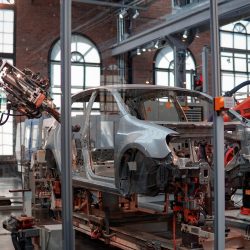How sheet metal drives the automotive industry forward
Last year almost 92 million vehicles were produced worldwide. That works out at around 250,000 cars and trucks a day – a staggering amount of automotive engineering!
Despite the use of plastics and carbon fibre in automotive parts, sheet metal fabrication is still vitally important to the industry. Let’s take a look at why that is…
Sheet metal is still key in the automotive industry
Most regular production cars are still made predominantly from sheet metal, and with an average vehicle consisting of more than 30,000 parts, accuracy, strength and precision are key.
One of the main reasons sheet metal is used in automotive engineering is that metals are able to sustain ‘plastic deformation’, which means they can be bent and formed into all the shapes required to produce a vehicle.
Automotive parts such as brackets, boxes, fan cowls, body panels, fluid tanks, instrument panels, grilles, mounts and fascias are all created using sheet metal fabrication.
They all help modern cars to go faster, go further, weigh less and help save people’s lives.
Prototyping
Dedicated metal fabrication experts can also prototype metal components and produce small bespoke runs for car manufacturers, racing teams, restorers and automotive engineering suppliers.
Initial prototypes can be quickly produced for clients to test prior to going into larger-scale production.
There are a wide range of sheet metal fabrication processes that can be used to create prototype automotive parts including CNC folding and CNC punching.
CNC folding
CNC folding is a process that involves the precision shaping of metal.
Computer Numerically Controlled folding allows metal fabrication firms to apply the precise amount of force to an exact point of the metal, so that the end product emerges perfectly formed and shaped to the client’s specific request.
An automotive part such as a side panel for a car can contain several cutaways and curves and cutaways. If too much force is applied to sheet metal when it is being worked on then it can break, whereas too little force could result in the curve not being exact.
CNC punching
CNC punching is a vital part of sheet metal fabrication and the production of sheet metal enclosures for automobiles.
A sizeable proportion of a car’s thousands of parts have to be either welded or fixed together with rivets, nuts and bolts.
CNC punching allows for exceptional precision in the punching of holes into sheet metal.
It produces holes designed to fit washers, nuts and bolts perfectly for the duration of the life of a vehicle.
With both CNC folding and punching, designs are first rendered and tested virtually, before the manufacturing process begins.
Laser cutting in the automotive industry
From design, development and manufacture through to testing and sales, laser cutting is one of the processes used at almost every stage of automotive engineering. A precision laser cutting service ensures that automotive parts are safe, reliable and made-to-measure.
From Alfas to Volvos, the Yorkshire Laser team are passionate about all types of vehicles, and we understand that car manufacturers need a laser cutting service and metal fabrication supplier who can create high-quality parts. We provide sound mechanical advice and deliver on time within strict budgets. With decades of experience, one of our experienced team members will be happy to help with your enquiry.
Call us on 01924 220236, email us on info@yorkshirelaser.co.uk or message us directly here.

